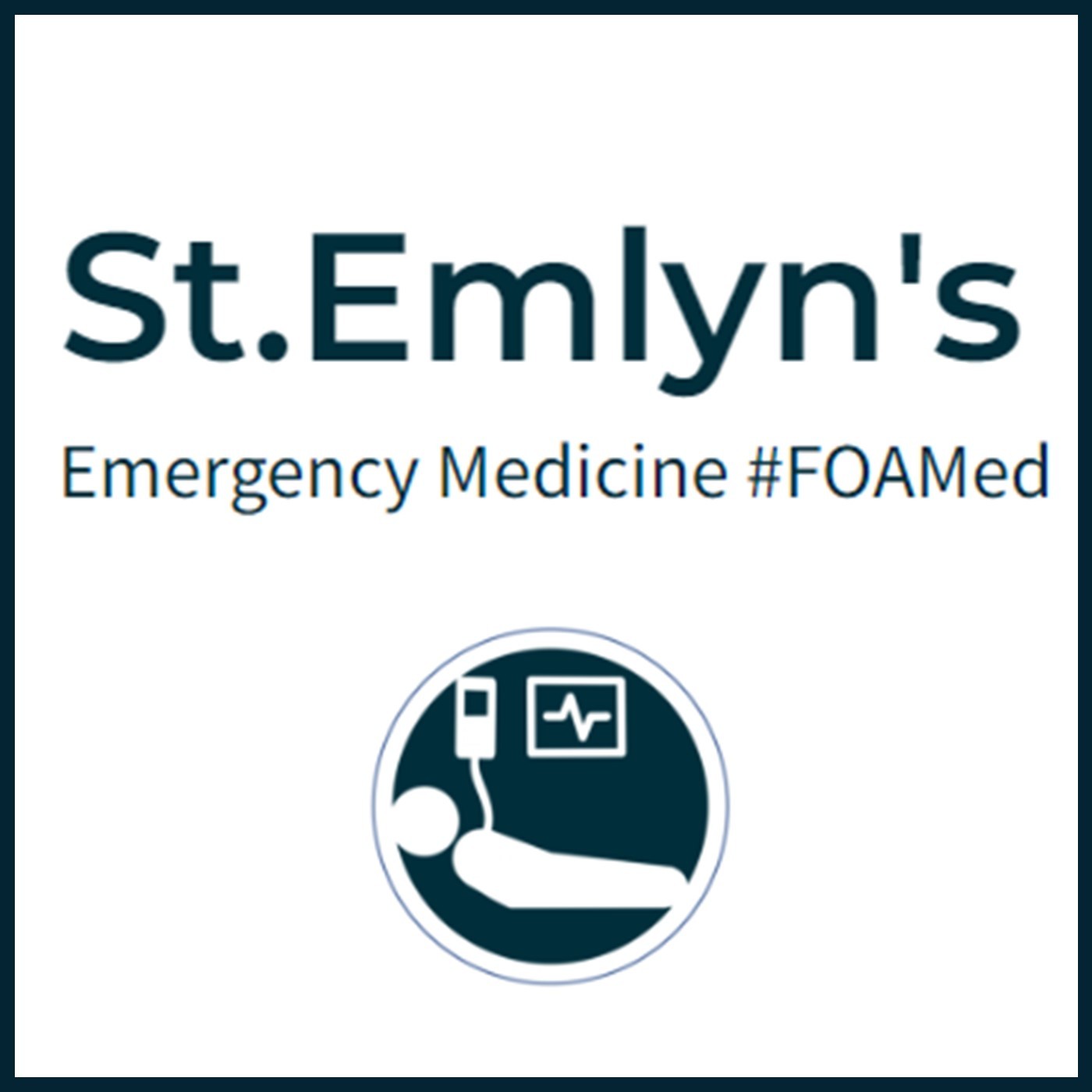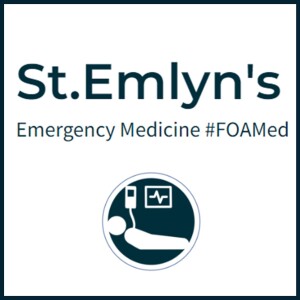
1.3M
Downloads
287
Episodes
A UK based Emergency Medicine podcast for anyone who works in emergency care. The St Emlyn ’s team are all passionate educators and clinicians who strive to bring you the best evidence based education. Our four pillars of learning are evidence-based medicine, clinical excellence, personal development and the philosophical overview of emergency care. We have a strong academic faculty and reputation for high quality education presented through multimedia platforms and articles. St Emlyn’s is a name given to a fictionalised emergency care system. This online clinical space is designed to allow clinical care to be discussed without compromising the safety or confidentiality of patients or clinicians.
A UK based Emergency Medicine podcast for anyone who works in emergency care. The St Emlyn ’s team are all passionate educators and clinicians who strive to bring you the best evidence based education. Our four pillars of learning are evidence-based medicine, clinical excellence, personal development and the philosophical overview of emergency care. We have a strong academic faculty and reputation for high quality education presented through multimedia platforms and articles. St Emlyn’s is a name given to a fictionalised emergency care system. This online clinical space is designed to allow clinical care to be discussed without compromising the safety or confidentiality of patients or clinicians.
Episodes

Wednesday Jun 24, 2015
Ep 49 - SMACC Workshops Review and Pearls
Wednesday Jun 24, 2015
Wednesday Jun 24, 2015
SMACC Chicago: Insights, Learning, and Community at St Emlyn's
The SMACC (Social Media and Critical Care) Conference in Chicago brought together healthcare professionals and thought leaders from around the world. The St Emlyn's team, comprising Iain Beardsell, Simon Carley, Rick Boddy, and Natalie May, participated in various workshops and sessions, sharing their experiences and insights. This blog post captures the essence of the conference, highlighting key learning outcomes and the vibrant community spirit.
Evidence-Based Medicine: From Theory to Practice
Simon Carley kicked off the day with a workshop titled "Gambling with the Evidence," focusing on practical applications of evidence-based medicine (EBM). Unlike traditional EBM sessions that often dwell on statistics and literature reviews, this workshop emphasized how to translate evidence into clinical practice. Simon, alongside Rick Boddy, Rob McSweeney, Ken Milne, and Rory Spiegel, explored how healthcare professionals manage the overwhelming volume of evidence and integrate it into their practice.
Key takeaways included strategies for storing and accessing evidence efficiently, influencing colleagues with evidence-based practices, and the importance of critical skepticism. The workshop stressed the responsibility of individuals to thoroughly understand the evidence before implementing changes in clinical settings. This session underscored the necessity of a balanced approach to adopting new practices, ensuring they are rooted in a comprehensive understanding of available evidence.
FOAM: Creating and Sharing Educational Content
Natalie May joined other prominent figures in the FOAM (Free Open Access Meducation) community for the "Brew Your Own FOAM" session. Alongside Salim Rezé, Rob Rogers, Haney Malamarts, and others, Natalie discussed the creation of blogs, podcasts, and other educational resources. The session, likened to an Apple bar, provided an informal yet informative platform for attendees to engage with experienced content creators.
Participants gained insights into the technical and creative aspects of producing FOAM content. The session encouraged the sharing of knowledge and resources, emphasizing that a diverse range of voices and perspectives enriches the medical community. Natalie highlighted the importance of FOAM in democratizing medical education, making high-quality information accessible to a global audience.
Exploring Chest Pain and Cardiology Pathways
Rick Boddy delved into the nuances of chest pain management and cardiology in his workshops. The morning session on evidence-based medicine included discussions on the values and outcomes in clinical trials, particularly concerning stroke and thrombolysis. Rick emphasized the varying perspectives of patients, doctors, and policymakers, stressing the importance of considering these viewpoints when evaluating clinical outcomes.
The afternoon's emergency cardiology workshop, featuring experts like Steve Smith and Louise Cullen, focused on chest pain pathways. The session covered a range of topics, from ECG interpretation to chest pain algorithms. Rick noted the growing interest in high-sensitivity troponins and the need for tailored chest pain pathways that cater to specific local populations. The discussion also addressed the challenges of implementing standardized pathways and the importance of trusting the evidence.
Getting Creative: Enhancing Communication Skills
Simon Carley also participated in a workshop titled "Getting Creative," which explored creative communication methods in the medical field. The workshop featured three sessions: Michelle Johnson on writing, Grace Slyo on visual presentations, and Rob Rogers on podcasting. Michelle Johnson, a skilled writer, guided participants through the art of crafting compelling narratives, particularly for blog posts. She emphasized the power of language and the importance of clear, concise communication.
Grace Slyo's session focused on improving visual communication, offering tips on graphic design and effective presentation techniques. She provided valuable resources and exercises to help participants enhance their visual storytelling skills. Rob Rogers concluded the workshop with practical advice on creating engaging podcasts, covering everything from content creation to technical aspects. Simon found the workshop incredibly valuable, noting that these skills are essential for effective knowledge dissemination in the medical community.
Pediatric Critical Care: Lessons and Strategies
Natalie May attended the SMACC mini session on pediatric critical care, where experts discussed managing critically ill children in emergency and intensive care settings. The session opened with Fran Lockey and Phil Hyde addressing pediatric airway and breathing management. They emphasized the importance of simple airway maneuvers and two-handed bag-valve-mask ventilation, debunking the myth that intubation is always necessary.
Lisa McQueen provided a poignant presentation on children in shock, referencing the case of Rory Staunton, a child who tragically died from sepsis after being discharged from the emergency department. The session highlighted the critical role of thorough reassessment and face-to-face evaluations in pediatric care. The importance of vigilance in monitoring children's progress before discharge was a key message.
Pre-Hospital Care: Excellence in Action
Iain Beardsell shared his experience from the pre-hospital care workshop, led by Carol Harbig from Greater Sydney Hems. The workshop featured a range of topics and speakers, providing an in-depth look at pre-hospital emergency medicine. The highlight of the day was a presentation by Ashley Leibig, who delivered a powerful talk on the emotional challenges faced by pre-hospital care providers and the importance of peer support.
Iain emphasized the value of visualization and mental rehearsal in preparing for high-stress situations. The workshop underscored the importance of practicing difficult scenarios mentally to ensure readiness when faced with real-life emergencies. This approach helps clinicians develop a clear action plan, reducing the likelihood of hesitation or error during critical moments.
The SMACC Community: Beyond Clinical Knowledge
One of the standout features of the SMACC Conference is its holistic approach to medical education. The conference not only covers clinical and technical topics but also addresses the emotional and psychological aspects of healthcare. Ashley Leibig's talk, reminiscent of Liz Crowe's impactful presentations, reminded attendees of the need for compassion and self-care in a field often dominated by high-stakes decision-making.
The conference provided ample opportunities for networking and community building. The St Emlyn's team noted the importance of connecting with peers, sharing experiences, and learning from each other. The collaborative spirit of the FOAM community was palpable, with participants eager to exchange ideas and support one another in their educational endeavors.
Preparing for the Big Stage: Final Thoughts
As the day drew to a close, the St Emlyn's team prepared for their presentations at the conference. The anticipation and nerves were palpable, reflecting the high regard in which the opportunity to speak at SMACC is held. The team emphasized the importance of thorough preparation, including practicing presentations and ensuring all details are in order.
The St Emlyn's team encouraged attendees and followers to engage with them, highlighting the value of these interactions in enriching the conference experience. They looked forward to meeting new people and deepening connections within the medical community.
Conclusion
The SMACC Conference in Chicago provided a rich and varied learning experience for the St Emlyn's team. From evidence-based medicine to pediatric critical care and pre-hospital medicine, the workshops offered valuable insights and practical knowledge. The conference also underscored the importance of creative communication, emotional resilience, and community support in the medical field.
For those unable to attend, the St Emlyn's team hopes this blog post offers a glimpse into the vibrant and dynamic environment of SMACC. The team is committed to sharing the knowledge and experiences gained at the conference, contributing to the broader medical community's growth and development.
As always, the St Emlyn's team encourages feedback and engagement from their readers. Whether you're interested in evidence-based medicine, FOAM, pediatric care, or any other topic, there's something for everyone in the rich tapestry of SMACC. Stay tuned for more updates and insights as the conference continues to unfold.

No comments yet. Be the first to say something!